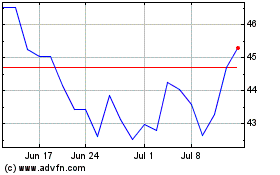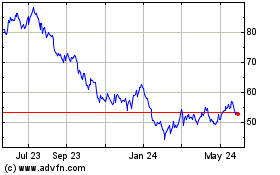Rare Earth Metal ETF Jumps On WTO Tensions - ETF News And Commentary
March 14 2012 - 2:11AM
Zacks
While high tech applications continue to find their way into
more parts of our lives and become more ubiquitous, we still often
forget some of the key components that make these innovative
systems possible. This is especially true of rare earth metals, a
specific subset of the periodic table that has a variety of uses.
These elements, which include little-known metals such as tungsten,
cerium, and molybdenum, find their way into nearly everything in
our modern society from jet engines and guided missiles, to
televisions and cell phones. As a result, pretty much everyone
depends on rare earth metals in one way or another, whether they
realize it or not.
Yet although these metals are extremely important to the global
economy, many companies are almost entirely dependent on a single
national source for their supplies. In fact, at this point, China
accounts for roughly 90% of total rare earth metal production
(including 97% of 17 key metals), a level that could allow China to
pretty much strangle the high tech market. After all, without ample
rare earths, many products which we take for granted today would
either become far more expensive, or in many cases, downright
impossible.
This concern didn’t always used to be a big deal, as there were
plenty of exports from China as the country had little use for
these high tech focused products and many of these goods weren’t
mass produced as they are today. But as China’s economy has grown
at a relentless pace over the past decades, the Chinese government
has sought to protect its rare earth supplies from outside demand
and ensure that businesses based in the country would have rare
earth metals above all else. In fact, China cut its rare earth
exports to Japan in 2010, spiking fears over a more global export
crunch pretty much at China’s whims (read What Bubble? China ETFs
To Start 2012).
Thanks to this ongoing fear, and the lack of large amounts of
readily accessible supplies in other markets, the U.S., the EU, and
Japan have joined forces to launch a WTO case against China in
order to force it to export more rare earth metals. The claim marks
the first time that the three economic powers have teamed up in the
WTO, although first there is a 60-day process for the two sides to
try and hash out their differences. If this doesn’t work, the three
can then ask the WTO to establish a dispute-settlement panel to
decide the case although this can take as long as two years.
China seems unwilling to give in on this issue citing
environmental concerns and that its export limits aren’t directed
at any one country. Additionally, China points out that there are
supplies of rare earth metals around the world and that Western
powers should work to exploit these deposits instead of harassing
China. With this backdrop and the potential two year waiting
period, Western nations may have no choice but to develop their own
supplies of rare earths instead of relying on China for these
crucial elements (see Three Commodity ETFs That Have Not
Surged).
Unfortunately, finding companies that are concentrated in this
market segment can be hard to do; most large mining firms are
diversified into many categories leaving minimal exposure to rare
earths. Of the few pure rare earth miners, many are small or mid
caps and can be prone to large swings in a short period of time,
especially if the prices of the metals experience high levels of
volatility. However, there currently is one ETF targeting the
space which could be an interesting choice for those looking to
make a play on this potentially lucrative corner of the market, the
Rare Earth Metal ETF (REMX) from Van Eck (read
Time To Buy REMX?).
REMX In Focus
REMX tracks the Market Vectors Rare Earth/Strategic Metals
Index, which is a rules based, modified capitalization weighted,
float adjusted index intended to give investors a means of tracking
the overall performance of publicly traded companies primarily
engaged in a variety of activities that are related to the mining,
refining and manufacturing of rare earth/strategic metals. The
product charges investors 57 basis points a year for its services
but it does have more than $220 million in AUM and it also sees
more than 120,000 shares of volume a day, implying high levels of
liquidity (read Three ETFs With Incredible Diversification).
In terms of holdings, the ETF currently has 29 components with
assets spread around the globe. Australian and Canadian companies
each make up about 19% of the total, and then are closely followed
by U.S. companies which account for another 17% of assets.
Unsurprisingly given the risks of the sector, small and micro cap
securities combine to make up about 57% of total assets while mid
caps account for another 30%. As a result, the fund has a definite
tilt towards the smaller mining firms. Top individual holdings
include Irish firm Kenmare Resources at about 9%,
and then two Australian companies Iluka Resources
(ILKAF) and Lynas Corp (LYSCF) at 8.3%
and 6.9%, respectively.
REMX has had a rocky performance history in the relatively short
time it has been on the market. In 2011, the fund was crushed along
with a number of other products in the resource space, falling by
about 39.3% in the time frame. However, the fund has come back
strongly so far in 2012, adding almost 18.6% since the start of the
year while currently paying out a yield over 5.4%. This includes a
nearly 8.5% gain in the past week as tensions over rare earth
supplies have heated up and the market segment has been brought
back into focus (read Three Overlooked Emerging Market ETFs).
Should the tensions with China continue or if more export bans
become likely, REMX could be an interesting choice as it represents
some of the only non-Chinese rare earth metal miners in the world
(although Chinese firms do make up about 7% of the fund too). If
that happens, the sector could see continued inflows, especially if
governments start to stockpile the products in anticipation of
tight supplies. Just remember, the sector is extremely volatile and
can be prone to large swings in a short period of time; rare earth
metal ETF investing certainly isn’t for the faint of heart.
However, for those who believe there is something to this China
issue, huge gains could be had if the WTO looks to have a limited
impact on the rare earth giant’s policies in the near term, putting
a premium on alternative sources of production.
Want the latest recommendations from Zacks Investment Research?
Today, you can download 7 Best Stocks for the Next 30
Days. Click to get this free report >>
To read this article on Zacks.com click here.
Zacks Investment Research
Want the latest recommendations from Zacks Investment Research?
Today, you can download 7 Best Stocks for the Next 30 Days. Click
to get this free report
VanEck Rare Earth and St... (AMEX:REMX)
Historical Stock Chart
From Dec 2024 to Jan 2025

VanEck Rare Earth and St... (AMEX:REMX)
Historical Stock Chart
From Jan 2024 to Jan 2025
